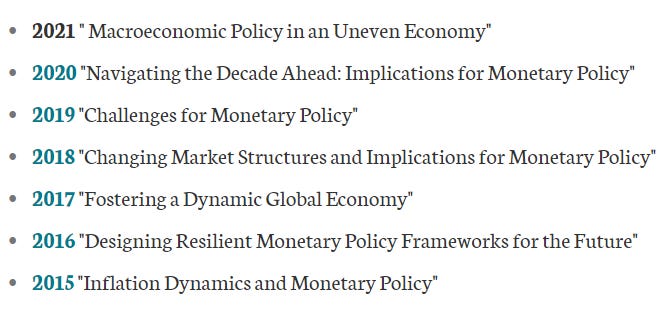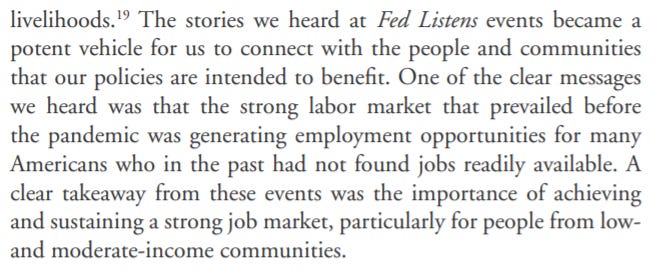Tapering ain't all that at Jackson Hole.
Powell's big speech is soon, and markets eagerly await hints on when the Fed will reduce its support of the economy by "tapering" asset purchases. Not me. I want Jay to speak to the people.
Next week is ‘Sleep-Away Camp’ for the Fed.
They won’t be roughing it among the homeless people in tents a few blocks from the Board in DC. Instead, they’ll fly (carbon emissions) across the country to a swanky resort in Jackson Hole, Wyoming. Please don’t infect the service staff with delta. Instead, center your ‘stories around the campfire’ on them and every worker in harms way, as well as every family and small business owner who is struggling in this crisis.
You’d think from news coverage and analyst reports that the theme of this year’s conference is, “TAPERING. TELL US WHEN!” It’s not. It’s “Macroeconomic Policy in an Uneven Economy." Key word is “uneven.” This is the new Fed.
The main event in Jackson Hole is the people the Fed serves. Tapering isn’t “uneven.” It’s clockwork: $120 billion in asset purchases each month now; less sometime between now and early next year; and someday zero then below. It’s jobs that are uneven. It’s family finances that are uneven. It’s the American Dream that is uneven.
Monetary policy alone cannot solve housing insecurity, close the Black-white wealth gap, or cool the rancor in politics. These are deep, systemic problems that go well beyond interest rates and the Fed’s bully pulpit.
The Fed does have a role to play. Its assessment of how hot the economy can run, how much the shortfalls in employment can narrow, matter. Congress has an even bigger role to play for us to attain full employment. Note well, the theme is “macroeconomic” not “monetary” policy. That’s a break from prior Jackson Hole conferences, see the most recent themes. Heavy on the Fed, light on the people:
The theme last year might be deceiving, since Jay did talk about people when he unveiled the Fed’s new framework for monetary policy.
Fed watchers freaked out about the new, “flexible, average inflation target.” I wrote recently about how it’s part of a sea change in macroeconomic policy. I won’t today. I want to highlight how Jay centered on the people the Fed serves not on Wall Street.
Here are some excerpts from his speech last year:
It may sound subtle, but “broad-based,” “inclusive,” and “shortfalls” are huge shifts. The Fed didn’t even mention its maximum employment mandate in a statement after an FOMC meeting until 2010. So, why change now? The Fed listened to people.
One year of listening sessions is not enough. The Fed must continue to hold itself accountable. We must hold them accountable too. To pitch in, my chart is going to Jackson Hole with FedUp, an advocacy group for full employment. It shows how the Fed walked away too soon after the Great Recession, raising the federal funds interest rate in 2015, which was referred to as “lift off.” It was a mistake, slowing the expansion and delaying people, especially those in marginalized groups, from getting jobs.
I will be watching Jay’s speech next week. I am rooting for him. Keep in mind, it’s not about him, as I argued in my opinion piece earlier this year. Jay did not start the transformation of the Fed. Frankly, credit goes to Coretta Scott King over 40 years ago in her push for the dual mandate. Jay’s carrying us forward.
The Chair cannot do it alone. The entire Federal Open Market Committee and the directors at the Reserve Banks are key to progress.
Personnel is policy!
President Biden has four appointments to make: Chair, both Vice Chairs, and a Governor. History suggests he’ll have another open Governor seat soon thereafter. Here’s one of my Dream Teams.
Yes, personnel is policy, but it’s policy that matters most. I fully endorse the principles that FedUp has put forward. I know many dedicated experts who would fight for these principles and the Fed’s dual mandate of price stability and maximum employment. I also know the Fed is being tested like never before, so we need best of the best.
Appointments to the Board of Governors are only one step toward a Fed that represents the people it serves. Fanta Traore and Kaleb Nygaard, former Fed research assistants, argue for more diverse directors at the Federal Reserve Banks.
Must Read
I will leave you with a powerful piece about the Fed. Rachel Seigel at the Washington Post spoke with women and men living in the tents near the Fed. Fed, never forget that people are counting on you.


“When asked, [one woman sat facing her tent and sipped a soda] said she was surprised to learn that Powell — someone with so much authority over the world’s economy — had noticed her community’s plight. with a bit of hope, and a bit of disbelief, she said: ‘Maybe we could invite him to visit.’”











